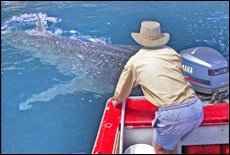L actu...

Extrait du New Zeland Herald: 02.03.06 By Anne Beston
"It might be one of the ocean's gentle giants, but diver Josh Worthington was taking no chances when a 9m whale shark suddenly appeared beside him.
"We got Josh out of the water pretty quickly because we weren't too sure. We just needed to identify it properly," said father Craig Worthington, who was aboard his runabout when the whale shark appeared.
The father and son were fly-fishing with a friend near the popular Hole in the Rock tourist spot at Piercy Island near Cape Brett when the shark's 1m-long dorsal fin "popped up" beside the 17-year-old diver among a feeding school of trevally.
In 25 years of diving and fishing around the Bay of Islands, Mr Worthington said he had never seen a whale shark before.
"It's tail was so powerful you wouldn't have wanted to get a swipe from it. We treated it with kid gloves," he said.
Josh got back into the water and swam with the shark, which turned toward him and followed him.
The giant fish, the biggest in the ocean and a rare sight in New Zealand waters, swum slowly around the fishermen's boat for about 15 minutes before heading south towards the Poor Knights Islands.
Mr Worthington estimated the shark's weight at about 8 tonnes.
Department of Conservation shark expert Clinton Duffy said that at 9m, the shark was bigger than others reported around New Zealand's coast but the species could grow up to 18m.
"They are completely harmless. Their teeth are only around 2mm high, and swimming with whale sharks is the basis of tourism ventures in some countries such as West Australia," he said.
Whale sharks live on krill and small fish and are found mostly in tropical waters. The biggest threat they face is from shark "finning", where the fin is cut off and they are left to die, a practice conservationists have campaigned against. The Chinese regard shark fins as a delicacy.
Whale Sharks
* Named for their immense size, the biggest recorded was 12m (39ft) long. Its skin can be up to 10cm thick, the thickest skin of any animal.
* Life span estimated between 60 and 150 years.
* A filter feeder, it has a capacious mouth which can be up to 1.5m (5ft) wide and contain up to 300 rows of tiny teeth.
* Mostly found in tropical and warm-temperate regions such as Western Australia and East Africa.

1 Comments:
tu crois vraiment qu'on va lire tout ca???? J'espère pas sinon tu vas etre décu!
bisouxx à toi et aux allemands....mdr
Post a Comment
Subscribe to Post Comments [Atom]
<< Home